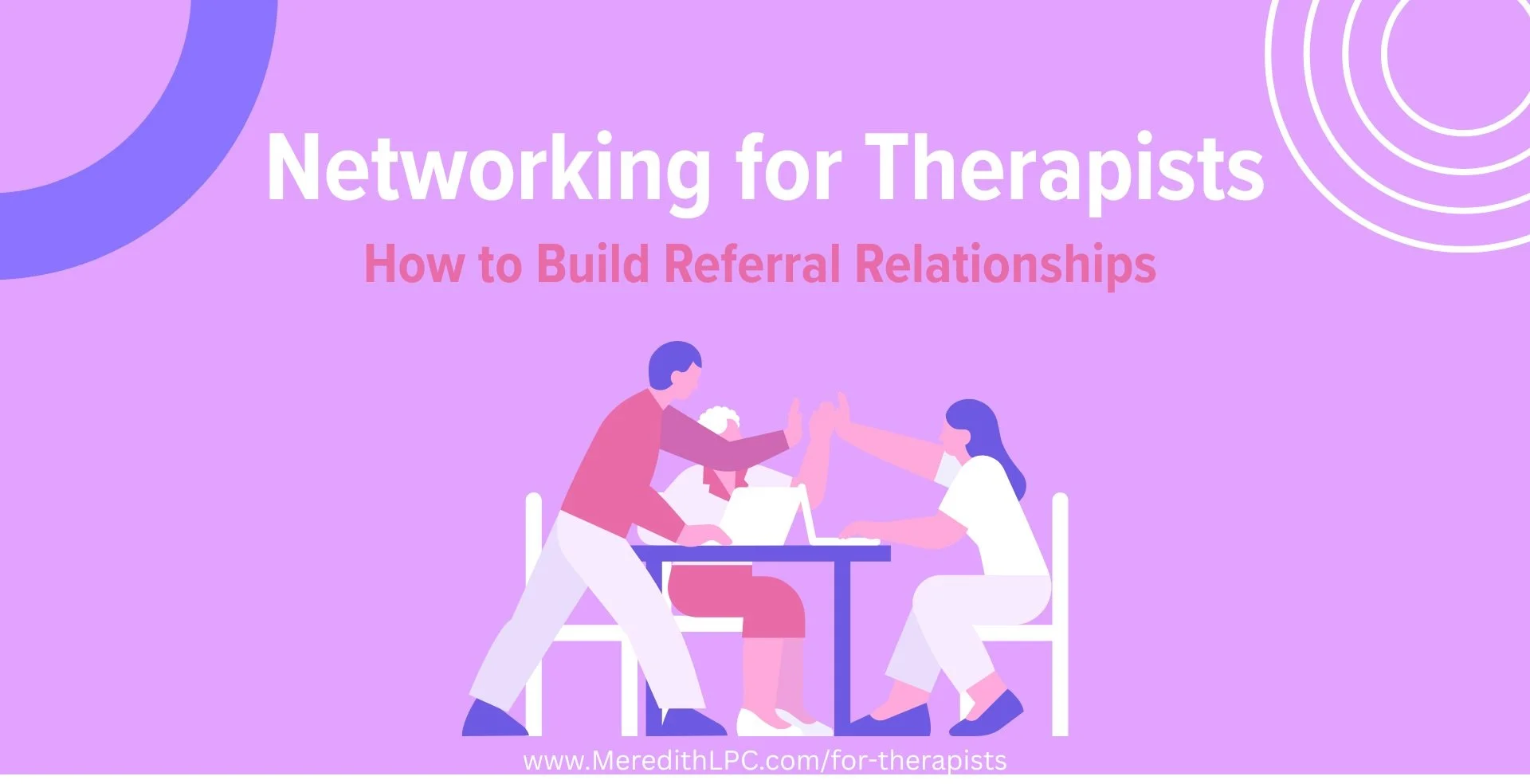Networking for Therapists: How to Build Referral Relationships
Let’s be real—most of us didn’t become therapists because we loved networking. For a lot of therapists, the idea of “putting yourself out there” can feel awkward, salesy, or even inauthentic. But if you run a private practice, building referral relationships isn’t just helpful—it’s essential.
Whether you're just starting out or looking to grow your practice, intentional networking can make all the difference in getting consistent, aligned referrals. And the best part? You don’t have to be extroverted, pushy, or fake to make it work.
In this post, I’ll walk you through why networking matters, how to do it in a way that feels natural, and some simple strategies you can start using right away.
Why Networking Matters in Private Practice
If you’ve ever felt frustrated by the inconsistency of new client inquiries—or overwhelmed by clients who aren’t a good fit—you’re not alone. One of the best ways to get more aligned, consistent referrals is by building genuine relationships with other professionals.
Here’s why it matters:
People refer to therapists they know and trust. It’s human nature. We’re more likely to refer clients to someone we’ve had a real conversation with.
It helps you build a niche. As you clarify who you serve, you can connect with people who work with complementary populations.
It builds professional support. Good networking isn’t just about referrals—it’s also about connection, collaboration, and community.
Think of networking less like marketing, and more like relationship-building. It’s about being visible, being yourself, and helping others do the same.
Where to Start: Who Should You Connect With?
Start with people who already serve your ideal clients. Think:
Therapists with different specialties, styles, or populations
Psychiatrists, nurse practitioners, and primary care doctors
School counselors and educational specialists
Divorce attorneys, financial planners, or career coaches
Doula and birth professionals, if you work in perinatal mental health
Past colleagues, supervisors, or grad school classmates
Group practice owners or agency directors
You don’t have to know everyone. Start with a handful of professionals whose work you respect—and whose clients may benefit from your services.
How to Reach Out (Without Feeling Awkward)
You don’t need a polished pitch or fancy elevator speech. A warm, authentic email is often all it takes.
Here’s a simple template:
Subject: Therapist Introduction & Possible Collaboration
Hi [Name],
I’m a therapist in private practice who specializes in [your niche]. I came across your work and thought we might be a good connection, especially since you work with [something you admire or relate to].
I’d love to set up a quick Zoom or coffee chat to learn more about your work and share a bit about mine—no pressure, just connection.
Let me know if that’s something you’d be open to!
Warmly,
[Your Name + Contact Info]
Be genuine, brief, and respectful of their time. Not everyone will respond, and that’s okay. The ones who do will likely become part of your long-term referral network.
What to Say During a Networking Call
When you do connect, keep the conversation balanced and curious. Don’t make it all about you. Ask questions like:
“What kinds of clients do you most enjoy working with?”
“What are some of your favorite referral resources?”
“Is there anything you’re looking for more support around right now?”
Then, share your specialty, style, and ideal client in a way that’s warm and clear. Bonus points if you follow up with an email that includes your info or a link to your Psychology Today profile or website.
Pro tip: If you click with someone, consider setting a reminder to check in every few months. Relationships grow with consistency.
Networking That Doesn’t Feel Like Networking
If coffee chats aren’t your thing, there are plenty of other ways to connect:
Join a local therapist Facebook group or online directory
Attend (or host) peer consultation groups
Offer free community workshops or CEUs
Show up at events where your ideal referrers are present
Give thoughtful referrals yourself—when you connect others, they remember you
Authenticity goes a long way. You don’t have to be everywhere—just be real where you are.
Keep It Simple and Sustainable
You don’t need to set up five networking meetings a week. Even reaching out to one new person a month can build powerful momentum over time. The goal isn’t to have a massive contact list—it’s to build a few strong, mutual relationships that grow with you.
And remember: you’re not selling a product. You’re offering something deeply valuable—your presence, your skill, your care. That doesn’t need a sales pitch. It just needs a conversation.
Want Help Growing Your Referral Network?
If you’re unsure where to start, what to say, or how to structure your practice for steady referrals, I offer one-on-one consultation for therapists. We’ll clarify your niche, refine your messaging, and build a sustainable networking strategy that actually feels good to implement.
Schedule a consultation here and let’s grow your practice in a way that works for you.
Related Articles: Best Free (and Low-Cost) Marketing Strategies for Private Practice
"Wait, What’s SEO?" A Beginner’s Guide to Marketing Yourself as a Therapist Online
How to Write a Therapist Directory Listing That Stands Out (And Actually Gets You Clients)


